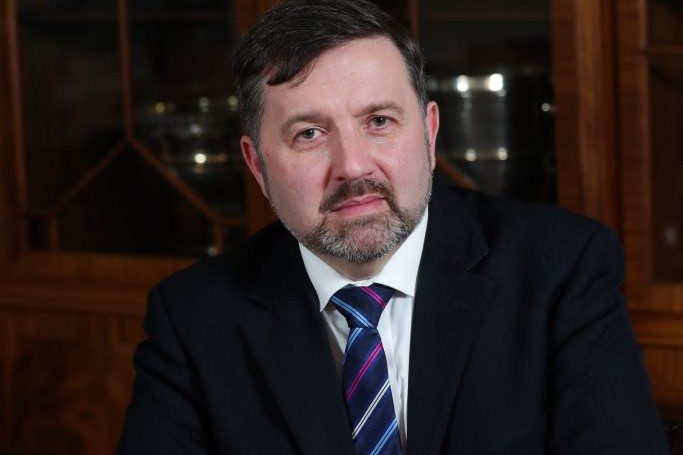Northern Ireland’s health minister to prioritise nurse pay talks

Northern Ireland’s health minister, Robin Swann, has committed to giving nurses a pay settlement for 2023-24, to resolve the ongoing industrial action in the country.
Mr Swann returned as health minister on Saturday, after the assembly and executive were re-established and power-sharing in the country was restored.
“Staff are the bedrock of the health service and they are entitled to proper remuneration for the vital work they do”
Robin Swann
The decision came two years to the day that the Democratic Unionist Party (DUP) walked out of the executive in defiance of post-Brexit trade agreements.
The DUP announced last week that it had finally reached a deal with Westminster and confirmed that, as such, it would return to government.
Mr Swann was health minister in Northern Ireland from January 2020 to October 2022. Speaking after his re-appointment to the post, he emphasised his intention to secure pay settlements for HSC staff.
It comes as nurses were among thousands of public sector workers who staged a mass walkout last month over the ongoing lack of a pay award and to demand pay parity with colleagues in England.
As part of the deal to restore Stormont, the UK government had promised a financial package worth over £3bn, including money for a public sector pay deal.
However, in their first few days back in power, Stormont’s politicians have argued that this is not enough because the package is for one year only.
In a letter sent today to the prime minister, Rishi Sunak, the executive warned that the financial package did not “provide a sustainable solution” for public sector pay.
Therefore, the government in Northern Ireland has called on Westminster for long-term funding stability to deliver public services in the country.
In addition, Mr Swann publicly stated his commitment to restoring pay parity for public sector workers, arguing that it was his “immediate priority”.
He said: “I want to see pay negotiations being initiated without delay, consequently I have written to the trade unions inviting them to early discussions.
“Staff are the bedrock of the health service and they are entitled to proper remuneration for the vital work they do,” he said.
Mr Swann explained that the newly formed government “do not have a minute to waste”, given the scale of the issues facing HSC services.
He said: “The pressures across all parts of the system have built up over many years and cannot be quickly or simply fixed.
“However, I am convinced that a way forward is achievable through investment, improved productivity and efficiency and changing how we organise some services.”
The Royal College of Nursing (RCN), whose members took part in the strike last month, welcomed the restoration of power sharing in Northern Ireland and the formation of an executive.
Rita Devlin, director of RCN Northern Ireland, said: “Following two years of political stalemate which has decimated our health and social care services, nurses hope that today will bring a brighter future for the people of Northern Ireland.
“Nursing staff have been fighting for months to get someone to listen to their concerns and act upon the deepening crisis in health which has been compounded by shortages of nursing staff and no pay award for 2023-24.”
Ms Devlin argued that there was “no time to waste” in resolving the pay issue and urged Mr Swann to have it “at the top of his list of priorities to resolve”.
In addition, she said that the college would like to see safe staffing legislation, promised four years ago, “progressed without delay”.
“It is our hope that we can then get on with making the changes necessary to transform health and social care to where it needs to be,” said Ms Devlin. “This will require courage and determination.”
Ms Devlin noted that nurses had told the RCN in Northern Ireland that “they cannot deliver the care they want to on a daily basis”.
She added: “Whilst we welcome the return of the executive and the opportunity for locally elected politicians to make decisions, please be left in no doubt that we are in a very serious situation which needs swift and urgent action.”
This is the second time in recent years that nurses in Northern Ireland have fallen out of pay parity with their UK colleagues, due to a collapse of Stormont. Strikes by nurses back in 2019-20 successfully resolved the situation then.
Responding to the return of the Northern Ireland assembly and executive, RCN general secretary and chief executive, Pat Cullen said: “Four years after pay parity was first restored to nursing staff in Northern Ireland, the executive must now take urgent action to restore parity once more.
“The past two years of political inaction has forced many to question their future in our profession, adding to chronic nursing shortages across all sectors.”
Ms Cullen said the last two years had been “a frustrating period for nursing staff and patients alike” and called for politicians to demonstrate their support for nursing and health care.
“We look forward to working closely with the new executive and health minister to influence on behalf of our members and prevent strike action being necessary to get their voices heard,” she added.






